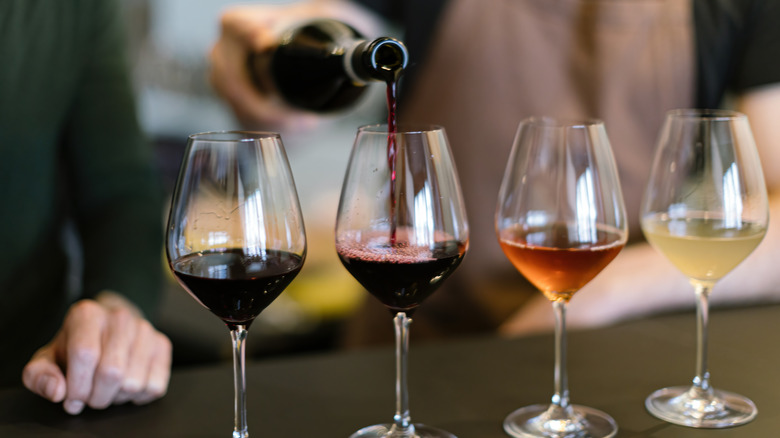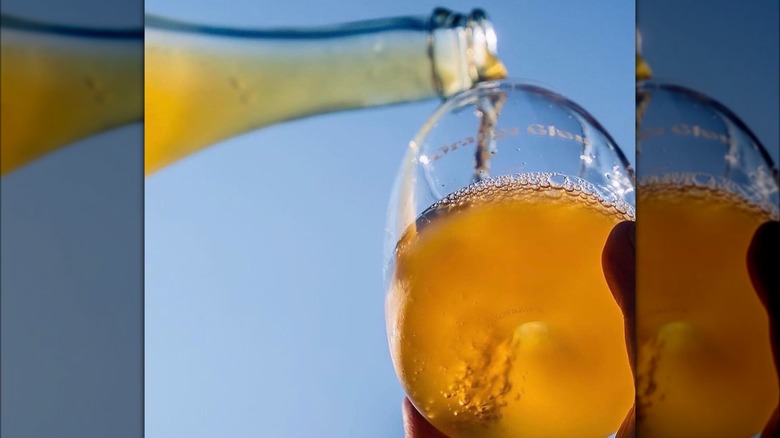A Sommelier Explains Why You Should Opt For Natural Wine Over Regular
The idea of natural wine might seem like a trendy new thing, but it's actually the opposite. Natural wine is making wine with hand-picked grapes, and without the use of the additives that many commercial wineries rely on, so technically speaking, it's the sort of wine-making that's been around for thousands of years. While plenty of things have improved over time, what about wines? Daily Meal reached out to Doreen Winkler, sommelier and founder of New York-based Orange Glou, to get her thoughts on if and why you should opt for natural wine the next time you pick up a bottle.
Winkler says that there's no question for her: "After taking the time to learn and understand natural wine, I cannot recommend anything else," she told us. Natural wine is just that—a natural product with nothing (or little sulfite added for stability) and nothing taken out—so I definitely think it's better quality."
What makes a natural wine is still being determined. It was only in 2023 that France's Institut National de l'Origine et de la Qualité approved its official guidelines for what makes a natural wine. As of this writing, there's still no legal definition in the U.S. It's generally agreed that natural wines are made with a hands-off approach, and for Winkler, that results in a line of wines that she says she recommends over standard wines every time.
Conventional wines can have a shocking number of additives
Let's start by touching on the major points regarding what makes natural wine. Doreen Winkler says that every part of the process is important — starting with the fact that grapes are hand-picked when they're ready, not according to a schedule. In addition to being largely additive-free (with the possible exception of some of those aforementioned sulfites), they're also pesticide- and herbicide-free and made with no added sugars.
Winkler says that those additives have become a big deal for her. "Over 70 additives are legally allowed in commercially produced wine in the U.S., and there's no legal obligation to disclose those ingredients," she told us.
Why are all those additives necessary in the first place? For starters, customers expect a certain brand and variety of wine to taste a certain way, so winemakers use additives to balance their products into something customers can reliably count on to be what they expect. That includes using ingredients like isinglass (dried fish bladders), gelatin, egg whites, and protease (which comes from the stomachs of pigs and cows) for clarification and finishing. There are also sugars, yeasts, de-acidifiers, sterilizing and stabilizing agents, and tannins, which usually come from oak chips.
How do you choose the right natural wine?
Since natural wine isn't filtered, it can appear cloudy. That's part of what's given rise to natural wine's reputation as being funky, and funky usually isn't a term you want to hear associated with something you're going to eat or drink. But here's the thing: It's only weird because most wine drinkers are used to the ultra-processed commercial wines that dominate the market. Today, there are so many natural wines available that there's going to be something that aligns with your taste. The trick is to find it, and Doreen Winkler stresses that's what she's there for.
"Wine can be confusing, that's why there are wine professionals," she told us. "For anyone interested in natural wine, I always recommend seeking out shops that focus solely on natural wine. Speak to the salesperson at the store about your likes and dislikes, and they'll help you find something right for you."
Even for those who know they're going right for a cabernet sauvignon or a pinot noir, if you're familiar with fortified wines (which are wines blended with spirits), and even you're familiar with pieces of trivia like the fact that not all wine is vegan, natural wine can be wildly confusing. (Just take orange wine: It gets its color not from oranges but from white grape skins left in contact with juice pressed from those same grapes.) There's plenty to learn about natural wines; Winkler says it's worth the time and effort.


